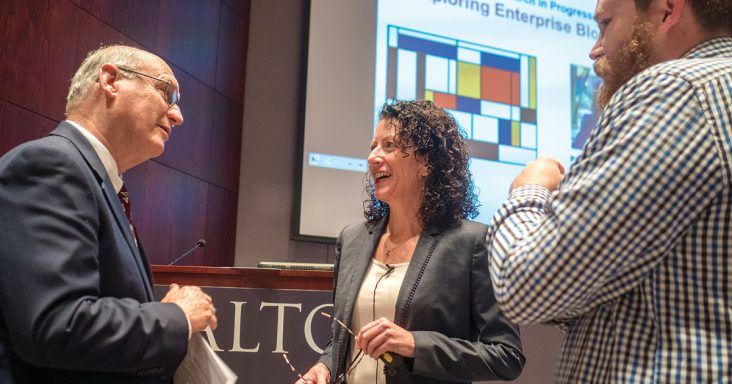Northwest Arkansas tech job growth outpaces non-STEM jobs
by June 5, 2019 4:10 pm 1,527 views

Mary Lacity, center, is the executive director of the University of Arkansas' Blockchain Center of Excellence. She said interest in the topic from both students and the business community is strong. (Courtesy University of Arkansas)
Technology jobs in the fields of science, engineering and mathematics in Northwest Arkansas are growing at a faster clip than most sectors, according to data furnished by Mike Harvey, chief operating officer for the Northwest Arkansas Council.
Harvey said local STEM (Science, Technology, Engineering, Mathematics) jobs grew by more than 80% between 2001 and 2018, compared with roughly 40% growth of non-STEM jobs. The council has made it a priority to focus on the growth of STEM jobs in part because technology impacts the future of other employment sectors, from retail and supply chain to medical and manufacturing.
Harvey reported the average hourly pay for STEM jobs in the region rose to almost $35 from 2001 to 2018, compared with just under $20 for non-STEM jobs. He said there has been a concerted effort to grow STEM jobs locally, noting the competition is fierce for STEM talent around the globe.
Mervin Jebaraj, executive director for the Center for Business & Economic Research at the University of Arkansas, said when splitting up STEM and breaking out technology jobs such as professions involving computers, software design, data analytics and information sciences including blockchain applications, the region still has a long way to go.
He said as of May 2018, there were 8,300 of these technology jobs in the region, which accounted for roughly 3.4% of all jobs. Jebaraj said since 2014 this sub-sector has grown about 1,250 jobs. This would include tech expansions by Tyson Foods and J.B. Hunt Transport as well as small technology shops like Bentonville-based RevUnit.
Jebaraj said to grow the talent pool substantially, the UA needs to produce more graduates and also retain graduates within the region post-graduation.
“A decent proportion of our graduates with IT degrees leave the state for jobs elsewhere,” he said.
Harvey said the UA does play an important role in pipeline development, but so do the high schools and other institutions of higher education like NorthWest Arkansas Community College and Northwest Technical Institute in Springdale.
He said industry is also playing a part in the expansion of technology jobs, with J.B. Hunt adding several hundred positions over the next three years.
Tyson Foods’ investment brought more than 300 technology jobs to downtown Springdale last year as that company undergoes a digital transformation.
TALENT RECRUITMENT, DEVELOPMENT
Tyson Foods chief technology officer Scott Spradley said the meat giant continues to grow its local technology workforce, an important element of the company’s future. Spradley said he has a vision for Northwest Arkansas to become a technical center, and perhaps downtown Springdale will pick up the moniker of “T-Town.” He has been in conversations with J.B. Hunt and Walmart to work together to build a consortium that would draw technology talent from around the country to work on blockchain applications that could be used in their respective businesses. He’s also supportive of collaboration between corporate partners and academia.
With so many companies recruiting tech talent and the limited supply, Spradley said he’s discussed the possibilities of companies working together to travel to larger cities like Austin, Texas; Raleigh, N.C.; San Diego or Boston to draw in professionals who want to be a part of the growth in Northwest Arkansas.
He said there is also a desire among the region’s three largest companies to foster and support local innovation and recruit investment dollars to help with funding. He said the region produces quality graduates, but they need more financial support.
RevUnit has grown its employee base to 105 positions, and roughly half of those are based in Northwest Arkansas. Tabatha McFadden, vice president of people operations at RevUnit, said there is a satellite office with 15 employees in Las Vegas, which resulted from a talent acquisition, and 10 employees in Austin. The Austin group is there to work with Walmart and shares office space with the retail giant. There are another 25 employees who work remotely from elsewhere outside the region.
Each of the employers who spoke to the Northwest Arkansas Business Journal for this story said finding technology talent is among their biggest challenges for continued growth.

“We are always proactively looking in the community for talent, being careful not poach from our customers but looking for those who are a cultural fit and want to be part of our growing team,” RevUnit co-founder Michael Paladino said, adding that acquiring talent is only part of the challenge. Retention is equally important.
RevUnit has also been active in writing curriculum and hosting interns in the Bentonville School District’s Ignite Professional Studies program, which combines technical training with professional development and business education.
“We hired one intern from Ignite and continue to create entry-level training while also working closely with the UA Global Campus IT readiness programs,” Paladino said. “We hired four people from that program and continue to help scale up the instruction level for more intermediate level jobs in technology. We knew from day one of RevUnit the talent pipeline would be an issue, and that is why we have been so involved with programs like Ignite and others.”
Paladino is a 2001 graduate of the University of Arkansas with a bachelor’s degree in computer information systems. He worked in technology-related jobs until co-founding RevUnit in 2012. The company now works with some of the largest businesses in the world helping to develop technology tools that enhance their operations.
Paladino feels at home in the entrepreneurial crowd and has also amassed an impressive client list in the past six years including Walmart, J.B. Hunt, Sam’s Club, Simmons, H-E-B, Tyson Foods and Virgin Hotels.
He said it’s important for companies large and small to stay on the cutting edge of technology, and the University of Arkansas is key in helping to grow technology talent that works on real issues impacting companies like Walmart or Tyson Foods.
BLOCKCHAIN OPPORTUNITIES
One of the most talked-about emerging technologies is blockchain and the various applications being tested in retail, supply chain, pharmaceutical and food processing. The University of Arkansas opened its Blockchain Center of Excellence in the fall and hired Mary Lacity as executive director.
Lacity said the interest from students and industry has been strong around blockchain.
“We are adding two faculty members, one for blockchain and one for analytics,” Lacity said. “It can be difficult to find teaching talent in these emerging fields, but we only need one strong candidate. The Ph.D. position for blockchain involves an international search, and we are hopeful to have someone hired for this coming fall semester. The other position will likely be filled from within the state.”
She said the success of the Blockchain Center of Excellence can be attributed to its corporate partners that span a wide variety of business sectors. Lacity said the advisory board partners put away their competitive edge to work together, in some cases, to learn more about blockchain.
“Blockchain requires sharing information across an industry ecosystem,” she said. “Microsoft and IBM are each on our advisory board, and while they may compete in many areas, they put that aside to gain a better understanding about blockchain that can add value to their businesses.”
